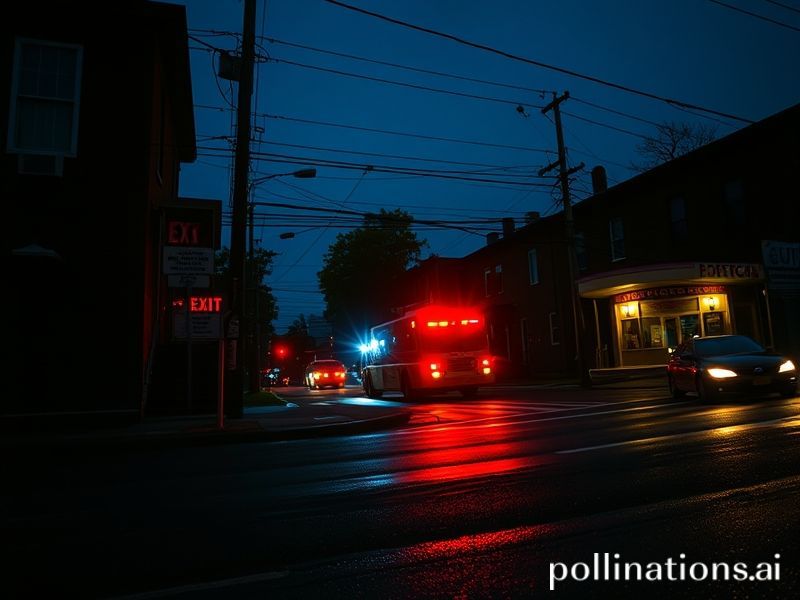When the Lights Go Out: A Global Tour of Humanity’s Shared Blackout Comedy
The lights blinked out in my corner of [Your City] at 19:43 local time last night, a civic event so routine it barely trended on neighborhood WhatsApp groups. Yet the ripple effect was instant: Wi-Fi flat-lined, Netflix froze mid-cliff-hanger, and half a streetful of home-office heroes discovered that their laptops’ “100 %” battery indicators are as reliable as a Buenos Aires inflation forecast. Cue candle-lit selfies captioned “living off-grid,” because nothing says rugged self-reliance like uploading despair via 4G.
Still, let’s zoom out. A measly suburb plunging into darkness is hardly special; the planet treats power outages like pop-up ads—ubiquitous, annoying, and increasingly personalized. From Lagos to Los Angeles, grids wobble under the same existential questions: demand spikes, cyber-mischief, suicidal squirrels. The difference is merely cinematography. In Norway, a blackout feels like an Ingmar Bergman scene—icy silence, mild herring panic—whereas in Caracas it’s telenovela melodrama: looting, banging pots, and a minister blaming the CIA while holding a candle that was clearly Made in USA.
Globally, 770 million people remain officially off-grid, so my 90-minute inconvenience is what they call “Tuesday.” Development banks love to remind us of this statistic at Davos, right before the conference center’s diesel generators kick in, discreetly humming beneath alpine snow. Nothing punctuates climate guilt like a backup turbine the size of Liechtenstein.
Energy experts insist the solution is “grid modernization,” a euphemism as comforting as “restorative dentistry.” Translation: raise tariffs, bury cables, pray hackers graduate to easier targets like Tinder. Yet even Europe’s shiniest smart grid can be humbled by a Ukrainian malware strain or an unscheduled heatwave that melts power-lines faster than a Gelato stand in Hades. Last month France flirted with brownouts as nuclear plants cooled their heels—literally—because the Rhône River was too hot to absorb reactor discharge. If you ever doubted global warming had a sense of humor, picture the birthplace of fission energy being defeated by lukewarm tap water.
Meanwhile Texas, that sovereign republic of rugged individualism, begged citizens to please not run washing machines during a polar vortex, proving that freedom’s just another word for “do your own laundry when I say so.” Texans responded by mining Bitcoin to stay warm, a financial innovation equivalent to lighting cigars with derivatives.
Back home, my local utility’s outage map glowed crimson on my phone—the cruel irony of using the last bar of battery to learn why you have no battery. Restoration estimate: three hours. Translation: somewhere between “tomorrow” and “stop asking.” The cause? “Vegetation interference,” corporate-speak for a tree that mistook a transformer for Tinder. Arborists call it pruning; the rest of us call it arboreal jihad.
Yet there’s geopolitical poetry here. That transformer was assembled in South Korea, cooled by minerals mined in Congo, shipped via Suez, and insured in London. My blackout was basically a UN General Assembly meeting with sparks. Multiply by millions and you see why superpowers lose sleep over “critical infrastructure.” Washington frets that Beijing’s grid software has Easter eggs; Brussels worries Moscow will gift another winter special; and everyone agrees the NSA could turn the lights off anywhere, but politely refrains—mostly—because even surveillance states prefer flushing toilets.
By 22:07 the fridge hummed back to life, the smart-speaker cheerfully resumed eavesdropping, and civilization’s greatest achievement—ice cream at 2 a.m.—was restored. Streetlights revealed the same hedonic treadmill we’d never left, only now with an extra layer of gratitude as thin as the utility company’s profit margin.
We’ll forget the outage by next week, just like we forget blood-pressure numbers and campaign promises. But somewhere a grid engineer will keep updating firmware, a hacker will rehearse ransomware, and a squirrel will eye another high-voltage snack. The world spins, powered by fragile cables and sheer denial. Remember that the next time you ask Alexa the meaning of “permanent temporary solution.”







